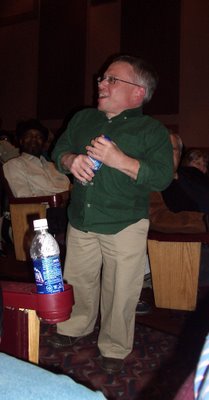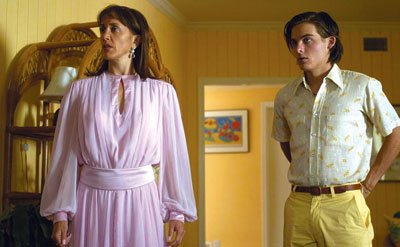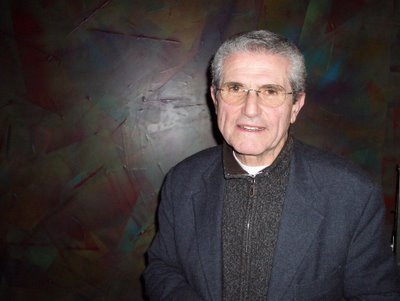Soft Reset
 After yet another additon to her Frequent Flyer account, Claire woke up in Cambridge, Mass., this morning and soon was snuggled in bed with Darlene for their usual soft start of the day. We are on the third floor of my parents' home. This visit will include the annual turkey trek to Ocean Park, Maine, along with several meetings on behalf of AGNI, the nation's best magazine of contemporary literature. My mother left a new bag of Starbucks whole bean House Blend in the kitchen up here, along with a package of Thomas' English muffins and a wooden bowl of fresh tangerines and Macintosh apples.
After yet another additon to her Frequent Flyer account, Claire woke up in Cambridge, Mass., this morning and soon was snuggled in bed with Darlene for their usual soft start of the day. We are on the third floor of my parents' home. This visit will include the annual turkey trek to Ocean Park, Maine, along with several meetings on behalf of AGNI, the nation's best magazine of contemporary literature. My mother left a new bag of Starbucks whole bean House Blend in the kitchen up here, along with a package of Thomas' English muffins and a wooden bowl of fresh tangerines and Macintosh apples.Denver days and life in Cambridge now begin to alternate more comfortably. Darlene found the dog pen and Claire's food she had left in our special closet on the third floor. It's a crisp, clear November New England day in the neighborhood. The mantra for the day which arose during my morning meditation time: Go slow and be a happy chump.
Encarta defines chump as "unwise person or dupe." Where I usually burn my hand on the stove during visits with my family is overestimating my grasp on reality and seeking ways to show off how well I am living my life compared with the twisted attempts of everyone else except the Dali Lama. A happy chump would not make this mistake. He would be glad to be here, or anywhere, looking for chances to become a little wiser.
Saturday, November 19, 2005
Radical Human Dignity

Last night at the Denver International Film Festival I learned that "midget" is the equivalent of the "N" word for dwarfs or little people. I also learned that dwarfism is a genetic mutation and that sometimes normal-sized people ask a dwarf if they can pick him or her up. The movie was a work in progress titled "No Bigger than a Minute," directed by and starring Steven Delano, who has worked for more than 25 years in film-related jobs here in Denver. The film and the Q&A afterward with Steven offered the chance to see the world from a completely different perspective, literally. This is Difference with a capital D. The movie itself is a wonder of images, interviews with other dwarfs, and Steven's own thoughts on what he learns as he makes the movie, all benefiting from his skills as an editor and director. The music is a translation of his DNA, the genes which determined his size. Another filmmaker, Werner Herzog, whose work often features dwarfs, says in the film that dwarfs possess a "radical human dignity." No kidding.
Over and over, the films of the Festival have portrayed radical human dignity in settings way outside the comfort zone of most viewers, including me.
Wednesday, November 16, 2005
Transexual Family Values

I love a movie that makes my family look boring and normal. And so it was that I fell in love with "Transamerica," the story of Stanley, a man just about to undergo a sex-change operation who discovers he has a son. The boy thinks the woman who bails him out of a New York jail is a church worker until the truth eventually unfolds during their poignant and often hilarious drive to California. Stanley, who has changed his name to Bree, is forced to visit his parents in Arizona for financial help after a robbery leaves him and the boy destitute. The parents are over-the-top mortified by their son's refusal to be a man, but they are also ecstatic to discover that they have a grandson. And so on. A movie with such a challenging topic would normally have less than zero chance at general distribution. But first-time feature director and screenwriter Duncan Tucker, who spoke after the screening, has done an incredible job. The movie received a big boost when it won Best Film at the Berlin Film Festival. I thought the lead actor was a man until nearly the end of the film. Instead, it was Felicity Huffman, who at the time of filming was preparing for a television pilot which went on to become the smash hit "Desperate Housewives."
Ten years or so ago, trying to accelerate my transition from a corporate career to the life of a poet, I had my left ear pierced in Casper, Wyoming, and visited my parents in Cambridge with considerable apprehension. They reacted way better than Stanley's parents reacted to his sex-change operation, but the difference in tension was a difference of degree rather than kind. At the time I used to take the earring out before having lunch in a restaurant with my father, wanting to spare him the trauma of a business buddy seeing the diamond stud. Then I heard that Dad had calmly told his secretary one day, "Yes, Len has an earring but he takes it out whenever he comes here for lunch." After that, I wore it all the time around my parents, until I decided I was well-enough established as a writer not to need props.
I doubt that my folks and large segments of America would see "Transamerica" as a movie that celebrates family values. But for me, it was a moving tribute to how much love can overcome.
Monday, November 14, 2005
Love and Anarchy
 Claude LeLouch, the legendary French director, spoke last night after a showing of his new movie, The Courage to Love, at the staggeringly great Starz Denver International Film Festival. It's staggering because you can't possibly see but a small set of the nearly 200 movies being shown this week. And it's great to hear from filmmakers such as LeLouch, to understand all that goes into making a feature film.
Claude LeLouch, the legendary French director, spoke last night after a showing of his new movie, The Courage to Love, at the staggeringly great Starz Denver International Film Festival. It's staggering because you can't possibly see but a small set of the nearly 200 movies being shown this week. And it's great to hear from filmmakers such as LeLouch, to understand all that goes into making a feature film.LeLouch's most famous movie for American audiences is "A Man and A Woman." His most recent offering seems problematic and has bombed in France, I heard at the French Reception afterward. LaLouch in his live interview with a film critic after the movie said he has made four versions of the movie, all of which will be viewable on the DVD. We saw the one most suited to international audiences. "The French version cannot even be understood by the French," he said through a translator. Myself, I liked it because it snarled up all the love relationships, which seems somehow accurate to love's refusal, on its own, to walk a straight line to happiness. I'm not saying the characters in the movie made good choices in their infidelities, jealousies, and suicides. But such potential darkness lurks just below the surface of any decent life, in my humble opinion. Seeing the distinctive French penchant for anarchy--recently played out yet again "dans les rues," in the streets--always invigorates part of me that chafes at my mainly linear, English way of being in the world. Being one-fourth French, it's clear to me that life ain't in any way a straight line, mon ami.
The film festival opened with a new movie based on the true story of a New Zealander who, in his 70s, realized a long-held dream to set a motorcycle speed record on the Bonneville Salt Flats. Anthony Hopkins, in the role of a lifetime, plays the hero, who lives in a shed and makes his way to Utah in a Don Quixote-like series of misadventures. The movie is "The World's Fastest Indian." Don't miss it.
Another highlight so far was a showing of "Only the Brave," a movie which a friend of mine, Eric Hayashi, co-produced. It tells the story of Japanese-Americans who, after having been sent to detention camps after Pearl Harbor, nonetheless volunteered to fight and die for the U.S. in Europe. After the packed showing yesterday afternoon, Eric asked if there were any veterans in the audience. Three very old Japanese-American men stood up slowly to heart-felt applause. One of the veterans had fought with the unit portrayed in the movie.
I also saw a very weird Japanese movie, L'Amant, about three middle-aged men who purchase the sexual services of a schoolgirl. It wasn't erotic, it was just weird. When Fifi is out of town, I like going to movies I know she would never agree to see. A better one with erotic themes was "How the Garcia Girls Spent their Summer," about a girl, her mother, and her grandmother all going through problematic but life-giving romances one summer in a Texas border town. The director, Georgina Garcia Riedel, spoke afterward. She looked to be about 25 years old, which made her accomplishment remarkable. She declined to say how much it had cost to make her movie, because she is trying to get it sold to a distributor and she needs to preserve her bargaining position. But she did say that the generosity of her parents had made the production possible. "What did they think of the sexual content?" a member of the audience asked. "Oh, they've always known I was a bit odd," Georgina replied with a warm laugh, "but they've always totally supported me in my art. This film isn't as shocking as some of the work I did in graduate school."
